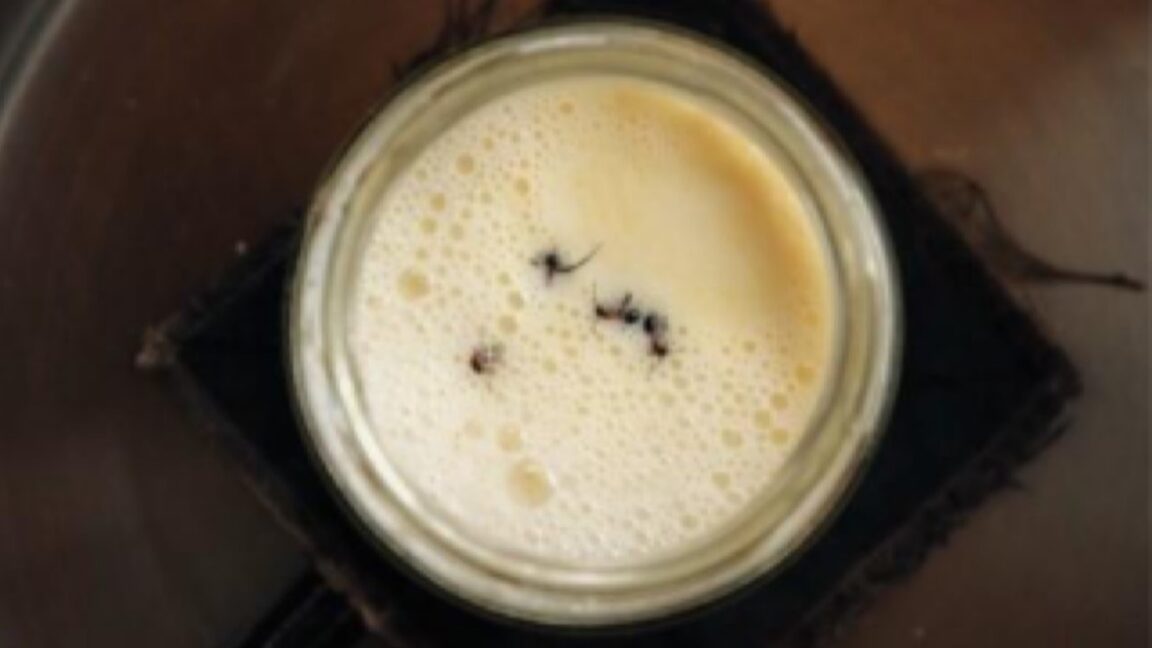Science
Scientists Revive Ancient Bulgarian Yogurt Recipe Using Ants

Researchers have successfully revived an ancient Bulgarian yogurt-making method that utilizes red wood ants as a fermentation agent. This time-honored practice, rooted in local tradition, has been detailed in a new study published in the journal iScience. The study not only describes the process but also explores the underlying science that makes this unconventional ingredient effective.
The method originates from the forests of Bulgaria, where the abundance of red wood ants led locals to drop live ants or crushed ant eggs into milk to initiate fermentation. Co-author Leonie Jahn from the Technical University of Denmark explained that traditional yogurt features a broader biodiversity of bacteria compared to modern varieties, which typically rely on only two bacterial strains. “This diversity enhances flavors, textures, and the overall character of the yogurt,” she noted.
To recreate this unique yogurt, the researchers ventured to Nova Mahala, Bulgaria. They followed instructions from co-author Sevgi Mutlu Sirakova‘s family, using fresh cow’s milk warmed to a scalding temperature, then adding four live red wood ants. The mixture was covered with cheesecloth and insulated before being buried in an ant colony for incubation. After 26 hours, the team retrieved the container and found that the milk had thickened, yielding a tangy yogurt that tasters described as “herbaceous” with hints of “grass-fed fat.”
The study also included laboratory experiments conducted in Denmark, where the team used worker ants to create sterile versions of the yogurt. They found that live ants contributed essential lactic and acetic acid bacteria, crucial for coagulating the milk. Interestingly, the ants also carry formic acid, which acidifies the mixture, creating an ideal environment for fermentation. The findings confirmed that only live ants produced the desired microbial community for yogurt.
The researchers’ exploration raised questions about the modern appeal of ant-based yogurt. To investigate whether contemporary diners would embrace this product, they collaborated with Alchemist, a two-Michelin-star restaurant in Copenhagen known for its innovative culinary experiences. The chefs crafted three distinct recipes featuring ant yogurt.
One creation was an “ant-wich,” an ice cream sandwich made with ant yogurt ice cream and an ant gel filling, all encased in a charcoal-colored egg-white tuile shaped like an ant. Another dish was “ant cheese,” resembling mascarpone but utilizing ants as a coagulant instead of citric acid. Finally, they created a clarified aperitif cocktail based on the traditional Milk Punch, incorporating ant milk wash and garnished with frozen ants.
Despite the intriguing culinary experiments, the authors cautioned against making ant yogurt at home due to potential health risks. Ants may carry parasites that could pose health dangers unless prepared within a controlled environment where food safety is prioritized. “We advise that this fermentation method should be maintained only as part of cultural heritage or by individuals knowledgeable in food microbiology,” they concluded.
While the idea of consuming ant-based yogurt may sound unappealing to some, in various cultures, insects are regarded as delicacies. For example, indigenous Brazilian communities have consumed Ica leafcutter ants for centuries, often referred to as “Brazilian caviar.” This cultural perspective invites a broader conversation about food traditions and the acceptance of unconventional ingredients in modern diets.
As researchers continue to explore traditional culinary practices, the revival of this ancient Bulgarian yogurt recipe highlights not only the richness of cultural heritage but also the scientific possibilities that arise from integrating nature into food production.
-

 Science3 months ago
Science3 months agoToyoake City Proposes Daily Two-Hour Smartphone Use Limit
-

 Top Stories3 months ago
Top Stories3 months agoPedestrian Fatally Injured in Esquimalt Collision on August 14
-

 Health3 months ago
Health3 months agoB.C. Review Reveals Urgent Need for Rare-Disease Drug Reforms
-

 Technology3 months ago
Technology3 months agoDark Adventure Game “Bye Sweet Carole” Set for October Release
-

 World3 months ago
World3 months agoJimmy Lai’s Defense Challenges Charges Under National Security Law
-

 Lifestyle3 months ago
Lifestyle3 months agoVictoria’s Pop-Up Shop Shines Light on B.C.’s Wolf Cull
-

 Technology3 months ago
Technology3 months agoKonami Revives Iconic Metal Gear Solid Delta Ahead of Release
-

 Technology3 months ago
Technology3 months agoApple Expands Self-Service Repair Program to Canada
-

 Technology3 months ago
Technology3 months agoSnapmaker U1 Color 3D Printer Redefines Speed and Sustainability
-

 Technology3 months ago
Technology3 months agoAION Folding Knife: Redefining EDC Design with Premium Materials
-

 Business3 months ago
Business3 months agoGordon Murray Automotive Unveils S1 LM and Le Mans GTR at Monterey
-

 Technology3 months ago
Technology3 months agoSolve Today’s Wordle Challenge: Hints and Answer for August 19









